Off-road diesel is chemically identical to regular diesel fuel. However, its application is restricted to specific applications as part of government incentives. Off-road diesel can be used in trucks, as heating fuel, in generators, and in a variety of other applications. What is off-road diesel?
Off-road diesel is a form of diesel exempt from some fees, rules, and taxes compared to standard diesel. The use of diesel engines in off-road applications is a significant source of nitrogen oxides and particulate matter. It is used for off-road vehicles and several types of machinery.
In this article, we attempt to provide an understanding of off-road diesel. The first part will be related to defining off-road diesel and how it differs from on-road diesel.
The second part of the article will be related to the things that need to be remembered while using off-road diesel – also the composition of off-road diesel. And the last part of this article will cater to the government regulations (United States of America) against the use of off-road diesel.
What is Off-Road Diesel?
Off-road diesel is for use on private property and construction sites like farms. It is more affordable than un-dyed diesel due to the absence of the tax.
The different laws for untaxed diesel fuel use vary both according to state and federal jurisdictions. However, in most cases, you’ll need to pay tax on whichever of these, the corresponding state law or the federal law, that you’re breaking. (source)
Difference Between Off-Road Diesel and Regular Diesel:
On-road diesel and off-road diesel are the two kinds of diesel fuel. Although they are both diesel fuels and both be used to power diesel engines, there are some significant distinctions.
So, what is the difference between on-road diesel and off-road diesel?
Differences | On-Road Diesel | Off-Road Diesel |
Road Legal | Yes | No |
Dyed | No | Yes (Red Dyed to clearly indicate that it is an Off-Road Diesel) |
Composition | 15ppm sulphur | 15ppm sulphur |
Cost | Slightly higher (There is no subsidy over it) | Cheaper (As government-subsidized it) |
1. Government Approval:
On-road diesel, as the name implies, is authorized for use in automobiles on the road. This is the kind of diesel that is distributed at gas stations. Any vehicle approved for use on public roads in the United States must utilize on-road diesel.
Off-road diesel is intended for use in machines that are not driven on the road, such as tractors, construction equipment, and generators. It is NOT allowed to use off-road diesel in a road vehicle, and using off-road diesel in a road vehicle may result in severe penalties.
2. Dyed:
On-road diesel is frequently referred to as "clear diesel" since, well, it's clear. On the other hand, off-road diesel is referred to as "dyed diesel" or "red diesel" since it is often coloured red. The dye is intended to prevent individuals from mixing up different kinds of diesel. It also enables easy testing to establish what sort of diesel is being used in a vehicle at a glance.
Off-road diesel is not taxed since it is not used in vehicles driven on roads. Hence it is less expensive than on-road diesel. Diesel for on-road use is subject to an excise tax.
Check the following article where I explained the complete differences between off-road diesel and regular diesel.
Off-Road Diesel Vs Regular Diesel- Differences You Must Know
Off-Road Diesel Price:
The off-road diesel price fluctuates depending on the supply and demand of the market.
The average price of off-road diesel is $4.90 per gallon. The price of a gallon of off-road diesel is determined by the types of crude oil used in creating it and the refining process. The price of off-road diesel is increasing rapidly, like that of regular diesel.
There is no difference in performance between the two kinds of diesel. However, off-road diesel is less costly for enterprises that operate off-road vehicles. You may use on-road diesel in off-road vehicles, but you’ll be paying state and federal taxes on the gasoline that you don’t need to.
In the end, on-road diesel and off-road diesel are effectively the same product. Ultra-Low Sulphur Diesel (ULSD) with no more than 15 ppm Sulphur is the mandatory criteria for new on-road vehicles and new off-road equipment.
Color of Off-Road Diesel:
The moniker “Red Diesel” refers to the special dye added to the fuel (Solvent Red 26 or Solvent Red 164) to make it physically recognisable from regular diesel fuel.
Off-road diesel (because it is used for off-road machinery and equipment) and untaxed diesel are two other common names (well, it is obvious why).
Off-Road Diesel Near Me (Step Wise Guide):
Finding the off-road diesel for your needs can be a hassle. Fueling up your truck with off-road diesel is not always a breeze and can be pretty challenging to find. Luckily, you can find the closest places to buy it from the steps provided below.
You can use the CFN locator to see the list of possible off-road diesel locations. The Commercial Fueling Network (CFN) is a network of gas stations and truck stops that sell off-road diesel.
Find locations near you that have off-road diesel by following these steps:
Step 1: Go to http://cfnfleetwide.com/site-locator/
Step 2: Fill in your address
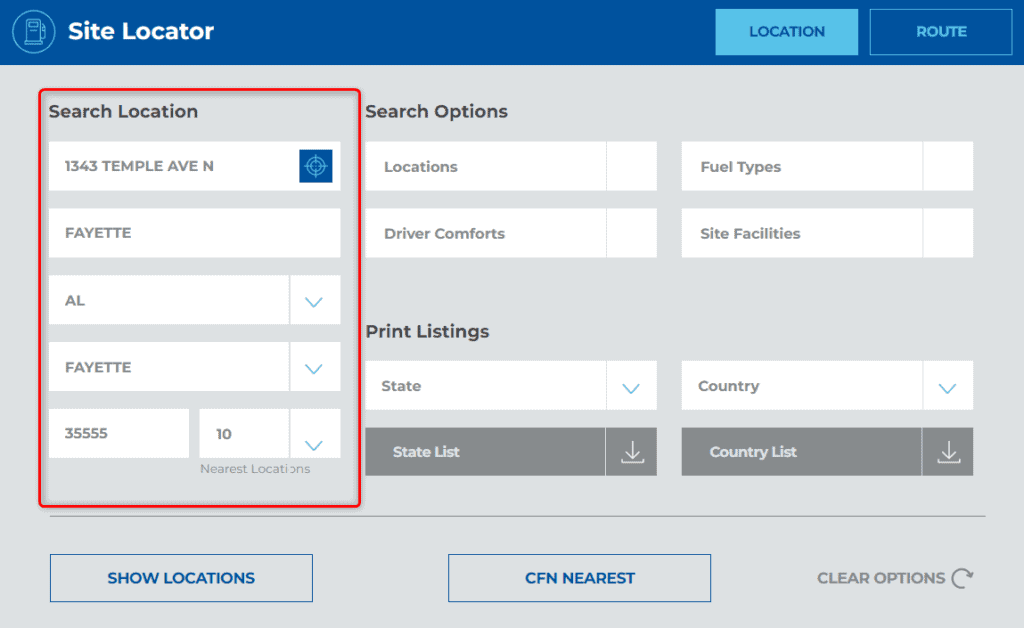
Step 3: Filter by selecting “Dyed Diesel” under the “Fuel Types” tab
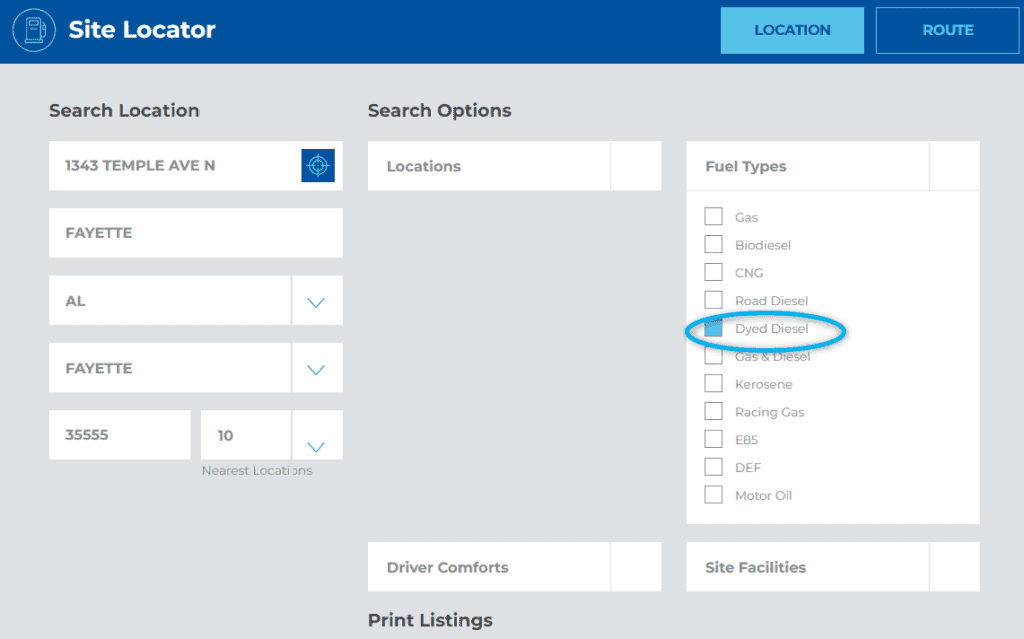
Step 4: Click ‘Show Locations’ and check the locations given near you
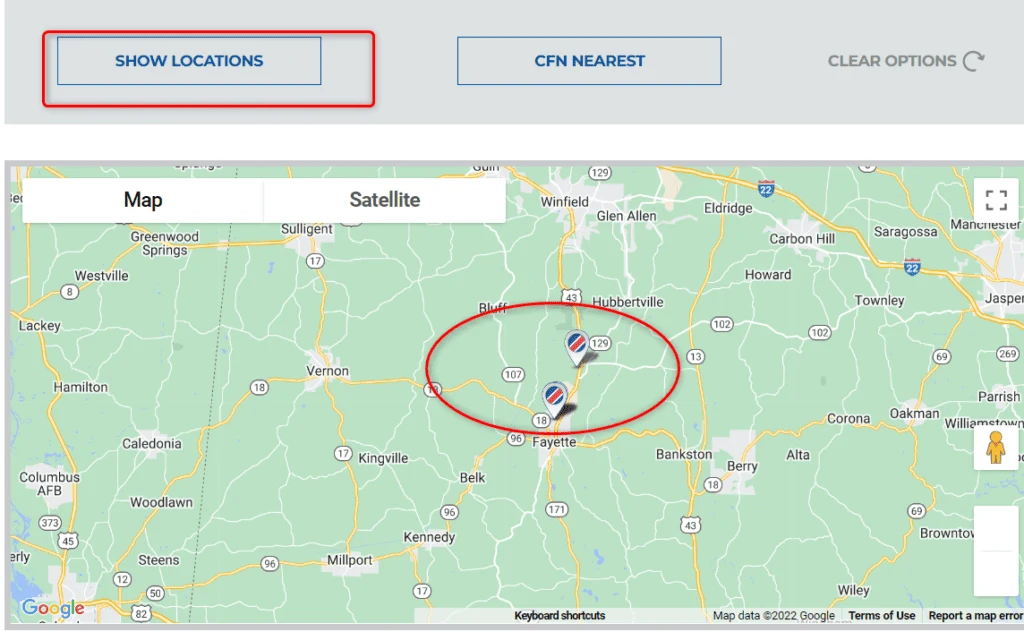

Step 5: Click on Details on the Location you find suitable

Can I Run My Truck On Off-Road Diesel?
Technically, you may, but utilizing red diesel for personal use is banned. In short, utilizing it outside of restrictions (for example, for your truck or automobile) makes you a little bit of a criminal.
It would legally be considered tax evasion. Furthermore, red diesel used to have a greater Sulphur content than regular diesel. There will be more on it later.
What is the Legal Status of Off-Road Diesel?
Rebated off-road diesel is essentially the government’s approach of providing incentives to construction, agriculture, and other enterprises requiring diesel fuel.
Paying less for gasoline would undoubtedly boost any company’s chances of turning a profit. In this context, utilizing red diesel for personal use may result in a tax evasion prosecution.
How Affordable is Off-Road Diesel?
On its website, the US Energy Information Administration states: “The Energy Information Administration (EIA) in the United States does not disclose pricing for off-road diesel fuel, often known as non-road or off-highway diesel fuel.”
While I cannot disclose the official price for off-road diesel, I can state that some dealers sell it for less than $2 per gallon — subject to certain conditions, of course.
Find Out: What is Suitable Off-Road Fuel?
Sulfur Content of Off-Road Diesel:
The EPA permitted a progressive reduction in Sulphur content for off-road diesel fuel. Before 2006, all off-road diesel had a Sulphur concentration of 500 PPM or more.
However, with the introduction of ultra-low Sulphur diesel (ULSD) as a requirement for road-going cars, off-road diesel had to be modified as well.
It took 8 years for refineries and the whole industry to embrace the new standard, which reduced Sulphur levels in off-road diesel to 15 PPM.
This significantly reduced Sulphur dioxide and Sulphur trioxide gas output, although it did cause some issues for refineries that had enormous stores of off-road diesel with 500+ PPM sulphur concentration. All of them were required by law to reduce the Sulphur level of the gasoline before selling it.
Diesel Dye Remover for Off-Road Vehicle:
Now that you know red diesel is often less expensive than on-road diesel, you may be wondering whether that bothersome red dye can be removed. It is possible, though. There are intricate handmade ways for removing the red diesel color. Of course, it is an unlawful endeavor, but it is possible.
We couldn’t precisely provide you with a lesson, but we can tell you that some unusual approaches are out there.
Some people used bread as a filter, while others used tampons, while others left the red diesel exposed to the sun, while yet others used diapers and the like to soak the color out. Regardless of what you use, it is illegal and not worth it.
Off-Road Diesel in Automobiles:
Red diesel is identical to typical white diesel. The only distinction is the red coloring. So, theoretically, you may use it.
It won’t harm a car’s diesel engine, and it will perform the same as running on pump diesel. However, as you’ve undoubtedly guessed by now, this is a prohibited activity.
Can Refrigerated Trailers Utilize Colored Diesel If They are Hitched to a Vehicle Travelling on the Highway?
Yes, refrigerated trailers are considered off-road vehicles. The diesel-powered refrigeration trailer is off-road equipment since its engine is not moving anything along the road. Any ultra-low Sulphur diesel fuel may be used in these trailers (dyed or explicit).
If you utilize clear on-road gasoline in a refrigerated trailer and maintain an account of the on-road fuel used in the off-road piece of equipment, you may submit for those fuel taxes to be reimbursed. However, the proof is necessary, so speak with your CPA or accountant.
What is the Procedure for Ordering Off-Road Diesel for a Building Project?
- The first step is to create a Star Wilco account. It’s simple to pay by filling out a quick credit application or using a credit card on the account. When it comes to fuels like diesel, Oregon and Washington are severely controlled.
- We must keep track of who orders and receives gasoline (yes, Oregon sometimes checks as the DEQ tracks every gallon of diesel moving into the state).
- Determine if you want an onsite loaner tank or a keep-full service package. Regularly, Star Oilco can provide bulk or wet hose gasoline to your work site.
- We are trying to make it as simple as possible to concentrate on your job rather than on fueling. Let us know what you want, and we’ll keep it simple and easy for you.
What Can I Do to Prevent Biological Development in My Off-Road Diesel Fuel Tank?
If you plan on keeping off-road or colored diesel for more than six months, ensure it is stabilized. Valvtect Plus Six is the gasoline additive that Star Oilco recommends.
A fuel microbicide with stability additives designed for long-term diesel storage is our suggested fuel additive.
This destroys and inhibits biological "hum-bugs" from growing in your tank. In your gasoline tank, bacteria, yeast, and algae may thrive.
Typically, a small quantity of water accumulates at the bottom of the fuel storage tank (be it the bulk tank you fuel out of or the saddle tank on your equipment).
How Can I Remove Water Out of the Fuel Tank of My Off-Road Diesel Equipment?
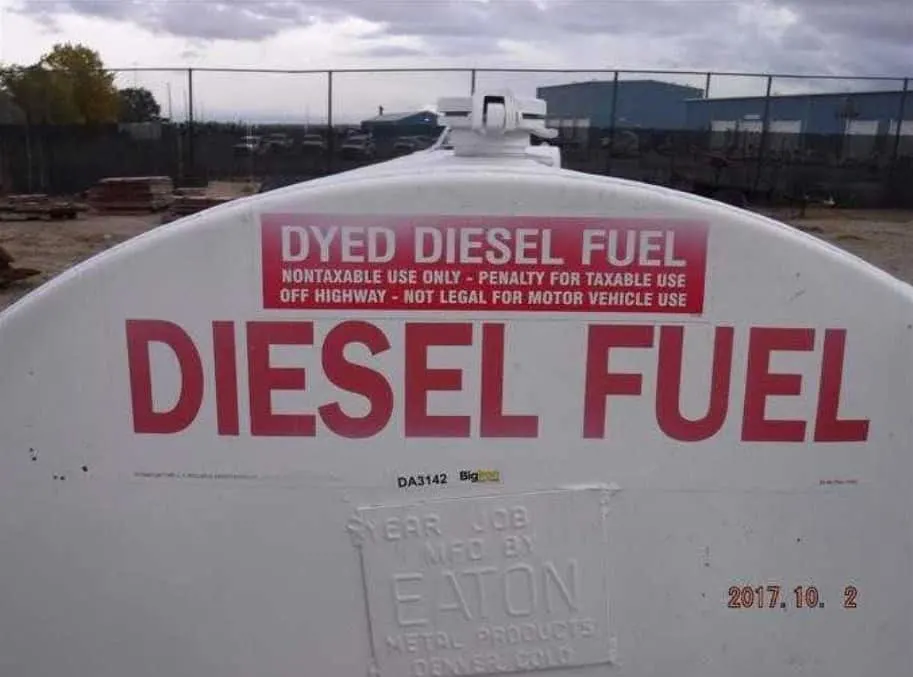
There are various approaches to this. What you want to accomplish depends on how much water there is and what it is in.
If you have a vast bulk gasoline tank, you should pump the tank bottom to get the water out. If you see excessive biological activity (Hum-Bug proliferating in your tank), you should do a lethal dose treatment on that tank.
It could be a good idea to pay a few thousand dollars to have a professional tank cleaning business come in and hand clean the tank before administering the kill dosage to eliminate anything developing in your tank.
If it’s the tank on your equipment, the best course of action is to empty it, clean it, and then add a lethal dosage of fuel microbiocide to ensure that nothing else grows.
If you wish to speak with someone, please contact Star Oilco; you do not need to be a client for us to guide you through some options you can do yourself.
What are the Off-Road Diesel Fuel Taxes?
Fuel taxes differ by state and, in some cases, by the municipality. When it comes to off-road diesel, the only taxes to consider are the fuel sales taxes. Dyed off-road fuel is not taxed in Oregon. In Washington state, sales taxes on dyed diesel are levied in addition to the fuel's purchase price.
(NOTE: There is no sales tax in Washington state if you use clear diesel because the road tax is charged.) If you want a more in-depth explanation, Star Oilco has a full explanation of Oregon Diesel Taxes (a unique system in the United States for local fuel tax collection of trucks over 26,000 GVW).
Does Off-Road Diesel Smoke More?
No, off-road diesel does not smoke more. The only difference with regular on-road diesel is the addition of dye in off-road diesel.
Generally, the concept is like below:
Black Smoke- Over Fuel White Smoke- Clocked Air Flow/ Oil Burning
What happens if I Use Coloured Diesel in a Road Vehicle?
If you are caught in Oregon, you could face a $10,000 fine per day. We’ve seen fuel tax evaders caught on multiple occasions, so be aware that Oregon is on the lookout for any amount of dye in the saddle tank of an on-road vehicle.
If you use low sulphur or high sulphur fuel and your vehicle has a particulate trap, you will have maintenance issues with your vehicle’s emission system.
Is it Possible to Use Dyed Diesel in a Diesel Pickup Truck?
Only if the pickup is intended for off-road use, it is possible to use dyed diesel in a diesel pickup truck.
If you plan to use that truck on a public road (even to cross a street) and dyed fuel is discovered in it, state regulators can (and do) levy fines of up to $10,000 per occurrence.
You can use off-road diesel as the vehicle’s fuel if you have a closed facility or a large farm and are not registering the vehicle for on-road use (the pickup must not leave the site).
If you have license plates and the vehicle is legal for on-road usage, any regulator who sees coloured gasoline in it will assume it is an on-road pickup.
How Can the Government Determine Whether or Not Someone Used Colored Diesel?
Typically, regulators may sample from the tank or spin the fuel filter to look for evident colored gasoline when checking for illegal usage of dyed fuel. If the gasoline is clear (or even slightly pink) and they believe dyed fuel was used in the car, they may use a special black light that will glow a clear hue indicating dyed fuel has come into contact with the vehicle.
They will beam that light on the filter, fuel tanks, and other engine compartment components that may have come into contact with gasoline. They will cite the vehicle operator if they detect even a tiny amount of the red dye used in off-road fuel.
Online, there are kits for filtering dye out of gasoline to eliminate the colour. Those kits will not remove enough dye to prevent these lights from detecting it.
Why is It Unlawful for Pick-Up Trucks to Use Off-Road Diesel?
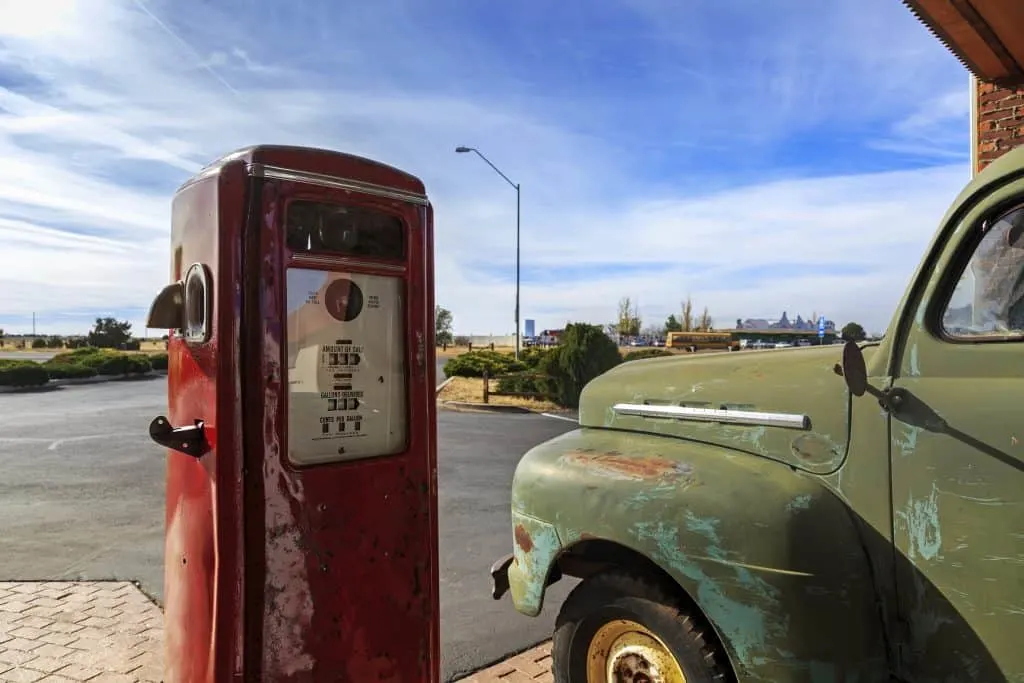
Off-road diesel is colored red to indicate that on-road fuel taxes have not been paid or that the fuel is tax-free. The federal and state governments levy fuel taxes for on-road fuel consumption to help fund the roads we all use.
If you use diesel for non-road equipment, machinery, or heating/boiler purposes, fuel taxes are waived, and the fuel is colored to make its tax-free status obvious.
In addition, regulators conducting a roadside or site level inspection may shine a black light on some regions of a vehicle’s system to determine whether dyed gasoline is being used in violation of the law.
Also Read:
Why Off-Roading Should be Banned?
Is Manual Better for Off-Roading? 4×4 Transmission
Frequently Asked Questions (FAQs):
Why is off-road diesel illegal?
Off-road diesel is illegal as it is not taxed. Therefore, if you are caught using it, you will be considered as tax evasion, and it is a criminal offence.
Will off-road diesel hurt my truck?
No, off-road diesel will not harm your truck. There are no significant differences between on-road and off-road diesel except that off-road diesel is not taxed. And if you are found to be using it without a permit, you will be fined.
Is off-road diesel different?
There are some differences in off-road diesel. For instance, the colour and composition may differ between on-road and off-road diesel. Yet, the significant and primary difference between off-road and on-road diesel is legality. Off-road diesel is not taxed; therefore, it is considered as road illegal.
What is off-road diesel called?
Off-road diesel has multiple names such as red dye diesel, off-highway diesel or red fuel. All these names determine the illegality of off-road diesel.

This is Surya. I am an experienced off-roader. I have been off-roading for many years across several terrains. I am passionate about 4×4 driving and want to share my knowledge and experience with others.
My goal is to provide you with the most comprehensive and unbiased information about off-roading.
I curated this article through my personal experience and expertise, and I hope it helps you with what you are looking for.

 (+91)9123743026
(+91)9123743026
 24/1 Nibedita Sarani. M.B. Road, Kolkata- 700051, India
24/1 Nibedita Sarani. M.B. Road, Kolkata- 700051, India